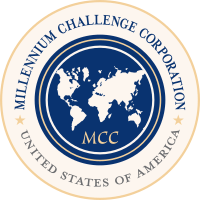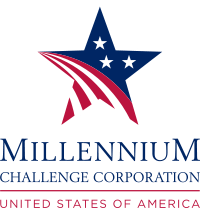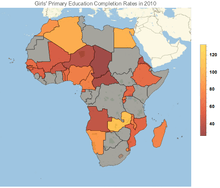Millennium Challenge Corporation
The Millennium Challenge Corporation (MCC) is a bilateral United States foreign aid agency established by the U.S. Congress in 2004, applying a new philosophy toward foreign aid. MCC is an innovative and independent U.S. foreign assistance agency that is helping lead the fight against global poverty by providing time-limited grants that promote economic growth, reduce poverty, and strengthen institutions. These investments not only support stability and prosperity in partner countries but also enhance American interests.
 Seal | |
 Logo | |
| Agency overview | |
|---|---|
| Formed | January 2004 |
| Headquarters | Washington, D.C. |
| Employees | ~300 (2020) |
| Annual budget | $905 million (FY 2020)[1] |
| Agency executive |
|
| Website | www.mcc.gov |
History
At the Inter-American Development Bank meeting on March 14, 2002, President George W. Bush called for a new compact for development with accountability for both rich and poor countries. He pledged to increase development assistance by 50% by fiscal year 2006 (which, by the end of 2004, doubled and was to double again by 2010).[2] Other development programs like USAID have been thought to suffer from many different and sometimes conflicting goals, which often are a result of political pressures, and for not delivering long-term economic improvements.
MCC was authorized in 2004 with bipartisan support. Its guiding principles are:
- Competitive selection: MCC’s Board examines a country’s performance on 20 independent and transparent policy indicators and selects countries based on policy performance.
- Country-led solutions: MCC requires selected countries to identify their priorities for achieving sustainable economic growth and poverty reduction. Countries develop their MCC proposals in broad consultation within their society. MCC then works in close partnership to help countries refine programs.
- Country-led implementation: When a country is awarded an MCC compact, it sets up a local accountable entity to manage and oversee all aspects of implementation. Monitoring of funds is rigorous, transparent and often managed through independent fiscal agents.
- Focus on results: MCC is committed to producing results and ensuring that the American people are getting a good return on their investment. MCC employs technically rigorous, systematic and transparent methods of projecting, tracking and evaluating the impacts of its programs.
Leadership
The current Chief Executive Officer of the Millennium Challenge Corporation is Sean Cairncross, nominated by President Donald J. Trump on January 8, 2018 and sworn in on June 24, 2019. As CEO, Mr. Cairncross leads the agency and provides strategic direction and vision as MCC fulfills its mission of reducing poverty through economic growth and advancing America’s interests around the globe.
Former MCC CEOs:
- Paul Applegarth, 2004-2005
- John Danilovich, 2005-2009
- Daniel W. Yohannes, 2009 - 2014
- Dana Hyde – 2014-2017[3]
The MCC Board of Directors is composed of the Secretary of State, the Secretary of the Treasury, the U.S. Trade Representative, the Administrator of USAID, the CEO of MCC and four private sector members appointed by the President of the United States with the advice and consent of the U.S. Senate. [4]
Selection indicators
MCC’s competitive selection process is a data-driven, transparent method for determining where the agency invests to reduce poverty and drive economic growth. To be considered for an MCC compact or threshold program, countries are expected to first pass MCC’s scorecard. The MCC Scorecard is an index combining a subset of 20 different policy assessments and measures a country’s policy performance in the areas of economic freedom, ruling justly and investing in its people. It also measures the strength and effectiveness of a country’s policy and institutional framework to prevent and combat corruption. Countries are ranked on the scorecard relative to their respective income groups. Scorecards are publicly available on the MCC website and updated each year.

The indicators are:[6]
| Indicator | Category | Source |
| Civil liberties [7] | Ruling justly | Freedom House |
| Political rights [8] | Ruling justly | Freedom House |
| Government effectiveness [9] | Ruling justly | World Bank Institute |
| Rule of law [10] | Ruling justly | World Bank Institute |
| Control of corruption [11] | Ruling justly | World Bank Institute |
| Freedom of Information | Ruling justly | Centre for Law and Democracy
Freedom House Reporters Without Borders |
| Immunization rate [12] | Investing in people | World Health Organization |
| Health Expenditures | Investing in people | World Health Organization |
| Girls' primary education completion rate [13] | Investing in people | UNESCO |
| Primary Education Expenditures | Investing in people | UNESCO |
| Natural Resource Protection | Investing in people | Columbia/Yale |
| Inflation rate [14] | Economic freedom | International Monetary Fund WEO |
| Trade policy [15] | Economic freedom | Heritage Foundation |
| Land rights and access index [16] | Economic freedom | IFAD / IFC |
| Regulatory quality [17] | Economic freedom | World Bank Institute |
| Fiscal policy [18] | Economic freedom | national sources, cross-checked with IMF WEO |
| Gender in the Economy | Economic freedom | World Bank |
| Business start-up [19] | Economic freedom | IFC |
| Access to Credit | Economic freedom | World Bank |
| Child Health | Investing in People | Columbia/Yale |
MCC’s Grant Programs
MCC signs either a compact or a threshold agreement with a partner country. A compact is a five-year grant awarded to selected countries with passing scores on the selection criteria indicators. If a country does not have a passing score but has a positive, upward trend on the selection criteria, it can still be eligible for a threshold program. The threshold program is a smaller program focused on policy and institutional reform. Each awarded partner country’s government must create a special purpose legal entity that will be accountable for implementing the a grant program.
Compact Program
Compacts are five-year agreements between MCC and an eligible country to fund specific programs targeted at reducing poverty and stimulating economic growth. MCC’s unique model for the development of compact programs reflects the principles that shaped the agency’s creation in 2004. These include the principle of country ownership, a belief that assistance is most effective when built on a partnership (or compact) in which recipient countries assume greater responsibility for their own economic development.
Threshold Program
MCC’s threshold program assists promising candidate countries toward becoming compact eligible with the opportunity to demonstrate their commitment to just and democratic governance, economic freedom, and investments in their people. By advancing policy reforms and strengthening institutions to address the most binding constraints to economic growth, threshold programs complement the “MCC Effect” created by the scorecard and allow MCC to assess the opportunity for partnership before committing to a compact. The “MCC Effect” refers to the positive impact of MCC’s rigorous commitment to sound policies beyond MCC’s direct development investments in the form of compacts and threshold programs in partner countries. MCC uses the same rigorous, evidence-based approach in threshold programs as it does in compacts, leading to high-quality programs that maximize potential systemic impact and lay the foundation for larger investments.
Concurrent Compacts for Regional Investments
In April of 2018, the AGOA and MCA Modernization Act gave MCC the authority to enter into concurrent compacts to promote cross-border economic integration, trade, and collaboration. In December 2018, MCC’s Board of Directors selected five countries in West Africa as eligible for concurrent compacts: Benin, Burkina Faso, Côte d’Ivoire, Ghana, and Niger. In 2019, in response to the Government of Ghana’s decision to terminate the concession agreement between the Electric Company of Ghana Ltd (ECG) to private operator Power Distribution Services Ghana Ltd (PDS), the MCC Board of Directors did not reselect Ghana for regional investments.
Past and Present MCC Country Partners
Key Agency Priorities
Women Economic Empowerment
Since its inception, MCC has mandated the integration of gender into its country programs. Gender analysis and a rigorous evidence base inform all aspects of MCC’s work, from selecting country partners, to identifying gender-responsive economic growth constraints, to supporting partner governments to enact legal and policy changes. Each MCC compact and threshold program requires a Social and Gender Integration Plan, which provides a comprehensive roadmap for social inclusion and gender integration throughout program implementation. MCC supports activities to expand income-generating activities and employment opportunities for women, increase women’s access to land, education, and skills development and enable women-owned businesses to take advantage of new market opportunities.
W-GDP Initiative
In February 2019, the White House announced the launch of the Women’s Global Development and Prosperity Initiative (W-GDP) with the goal of reaching 50 million women around the world by 2025. MCC supports the W-GDP and is proud to be a leading partner on this initiative, the first whole-of-government approach to economically empowering women around the world.
Blended Finance
MCC uses blended finance as a key tool to mobilize private capital to create better opportunities and maximize project impact. Blended finance provides a framework for aligning the objectives, competencies, and resources of the public and private sectors to scale up finance and investment flows in emerging markets.
Regional Authority
In 2018, the AGOA and MCA Modernization Act was signed into law by President Trump and provided MCC with new authority to utilize cross-border regional investments that address economic challenges, expand regional markets for a larger-scale impact on poverty reduction, and facilitate increased trade and investment.
Reception and impact
Studies by groups such as the conservative Heritage Foundation in the United States have shown that many developing countries that have received foreign aid have seen their per capita income fall or stagnate over the last 40 years. The Heritage Foundation has consistently supported the MCC's approach, which has used their trade measure from the Index of Economic Freedom.[44] In April 2005, the United States Government Accountability Office issued a favorable report about the work of MCC.[45] The Program Assessment Rating Tool (PART), which reviews the efficiency and results produced by U.S. government programs, was scheduled to be reviewed in 2007.[46] A study in 2006 looking at the "MCC effect" estimated that potential recipient countries improved 25% more on MCA's criteria than other countries, after controlling for time-trends.[47] The World Policy Council, headed by Ambassador Horace Dawson and Senator Edward Brooke, recognizes the MCC as the most recent and most promising program in its area, and recommended that the Bush administration and the Congressional Black Caucus focus on full funding and an accelerated pace of spending. [48] Doing Business 2007 cited the Millennium Challenge Accounts as a catalyst for reforms underway in 13 countries.[49] Also, Freedom House released subcategories for the first time since it was being used as part of the MCC's measurements to allow for more granular distinctions.[50] Also, the number of days it takes to start a business in low and low-middle income countries has decreased significantly since 2002, which is one of the factors the accounts measure since rapid business registration is thought to increase economic activity.[51]
Since 2014, MCC has been consecutively ranked as the Most Transparent Agency in U.S. Government by the Publish What You Fund (PWYF) Aid Transparency Index. The Aid Transparency Index is an independent measure of foreign aid transparency among the world’s major development and donor agencies and is released every two years.[20]
In its 2019 Invest in What Works Federal Standard of Excellence[21], Results for America ranked MCC number one, for the fourth year in a row, among all federal agencies for using evidence, results, and learning to drive positive outcomes. The index highlights how federal agencies are building the necessary infrastructure to use evidence and data in their budget, policy, and management decisions.
References
- "FY 2019 Congressional Budget Justification - Department of State, Foreign Operations, and Related Programs" (PDF). U.S. Department of State. February 12, 2018. Archived from the original (PDF) on February 12, 2018. Retrieved February 24, 2018.
- "About MCC". Millennium Challenge Corporation. Retrieved September 4, 2016.
- "Board of Directors". Millennium Challenge Corporation. Retrieved 2020-07-10.
- "Board of Directors". Millennium Challenge Corporation. Retrieved 2020-07-10.
- "MCC Open Data Catalog". FY2014_timeseries. Retrieved 11 Nov 2014.
- "MCC Selection indicators". Retrieved 6 May 2011.
- https://www.mcc.gov/who-we-fund/indicator/civil-liberties-indicator
- https://www.mcc.gov/who-we-fund/indicator/political-rights-indicator
- "Government Effectiveness Indicator".
- "Rule of Law Indicator".
- "Control of Corruption Indicator".
- "Immunization Rates Indicator".
- "Girls' Primary Education Completion Rate Indicator".
- "Inflation Indicator".
- "Trade Policy Indicator".
- "Land Rights and Access Indicator".
- "Regulatory Quality Indicator".
- "Fiscal Policy Indicator".
- "Business Start-Up Indicator".
- "United States, Millennium Challenge Corporation (MCC) - Aid Transparency Index 2020". Publish What You Fund. Retrieved 2020-07-10.
- "2019 Federal Invest in What Works Standard of Excellence". Results For America 2019. Retrieved 2020-07-10.
External links
| Wikimedia Commons has media related to Millennium Challenge Corporation. |